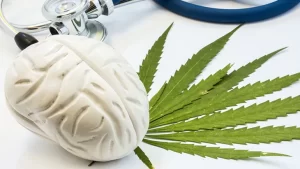|
Getting your Trinity Audio player ready...
|
Cannabis consumption rarely triggers episodes of acute psychosis in those who do not have a pre-existing psychiatric disorder, according to the results of a meta-analysis published in the journal Nature: Mental Health.

An international team of researchers from Switzerland and the United Kingdom reviewed the relationship between marijuana use and cannabis-associated psychotic symptoms (CAPS) in 162 studies involving over 210,000 cannabis consumers.
Researchers reported that the risk of psychosis “appears most amplified in vulnerable individuals,” particularly those with “pre-existing mental health problems” such as bipolar disorder. By contrast, they acknowledged, “[N]either young age of onset of cannabis use nor high-frequency use of cannabis or the preferred type of cannabis (strains high in THC, strains high in CBD) was associated with CAPS.”
Overall, they estimated that 0.5 percent of those who consume cannabis may experience a psychotic episode during their lifetime. That percentage mirrors estimates published in a prior study involving 233,000 European marijuana consumers. The authors of that study concluded, “Rates of CAPS as observed here are comparable to rates of other drug-induced psychosis, such as alcohol-associated psychosis (around 0.4 – 0.7 percent).”
The studies’ findings push back against claims that marijuana exposure is a frequent trigger for psychosis and other mental health disorders.
Full text of the study, “Assessing rates and predictors of cannabis-associated psychotic symptoms across observational, experimental, and medical research. Additional information on cannabis and mental health is available from NORML’s white paper, ‘Cannabis, Mental Health, and Context: The Case for Regulation.’





